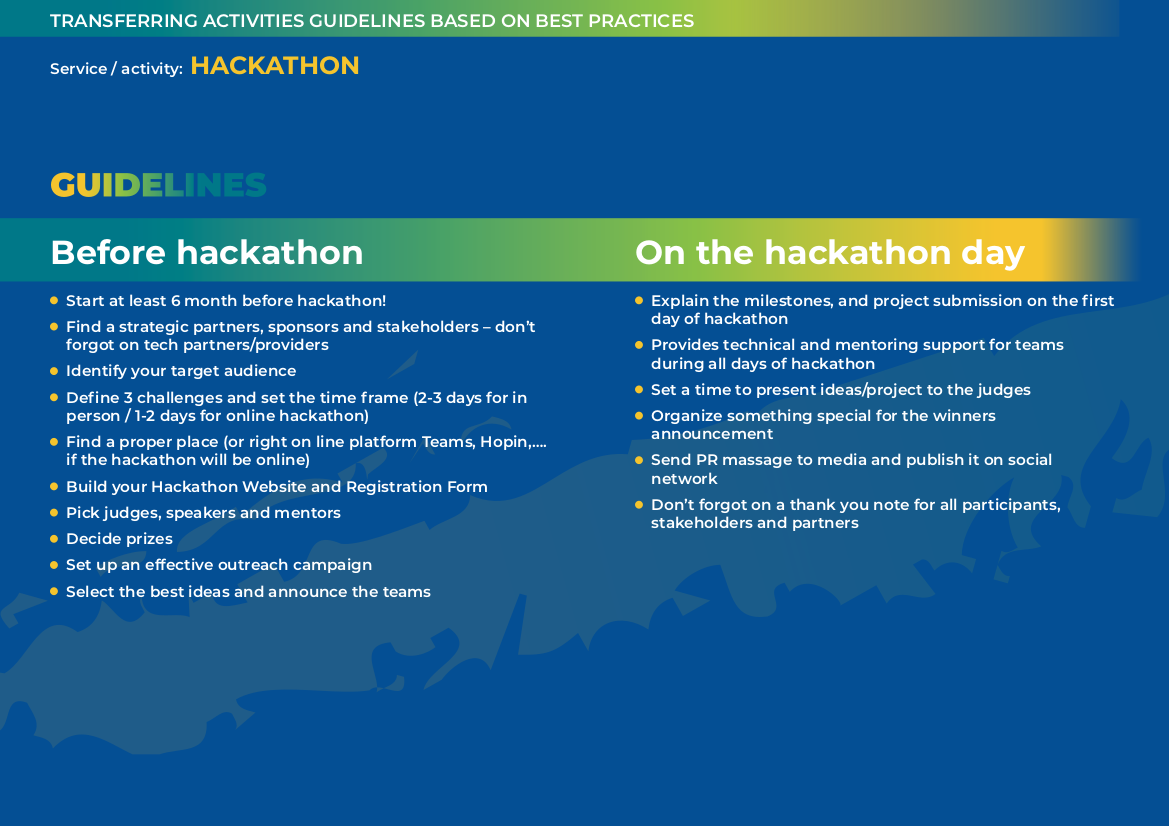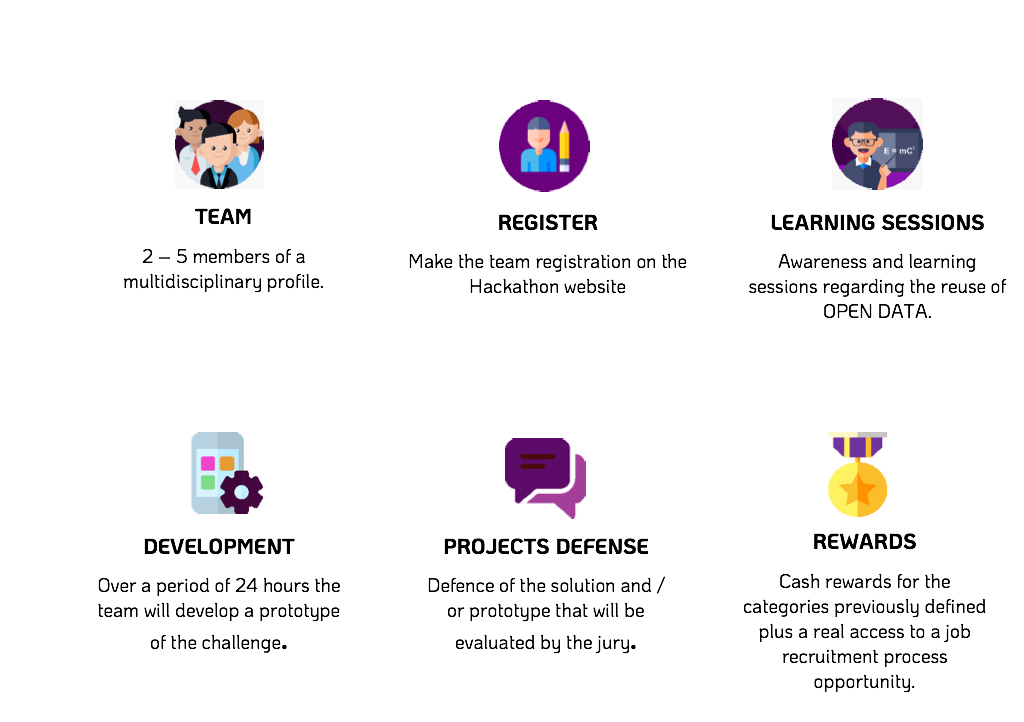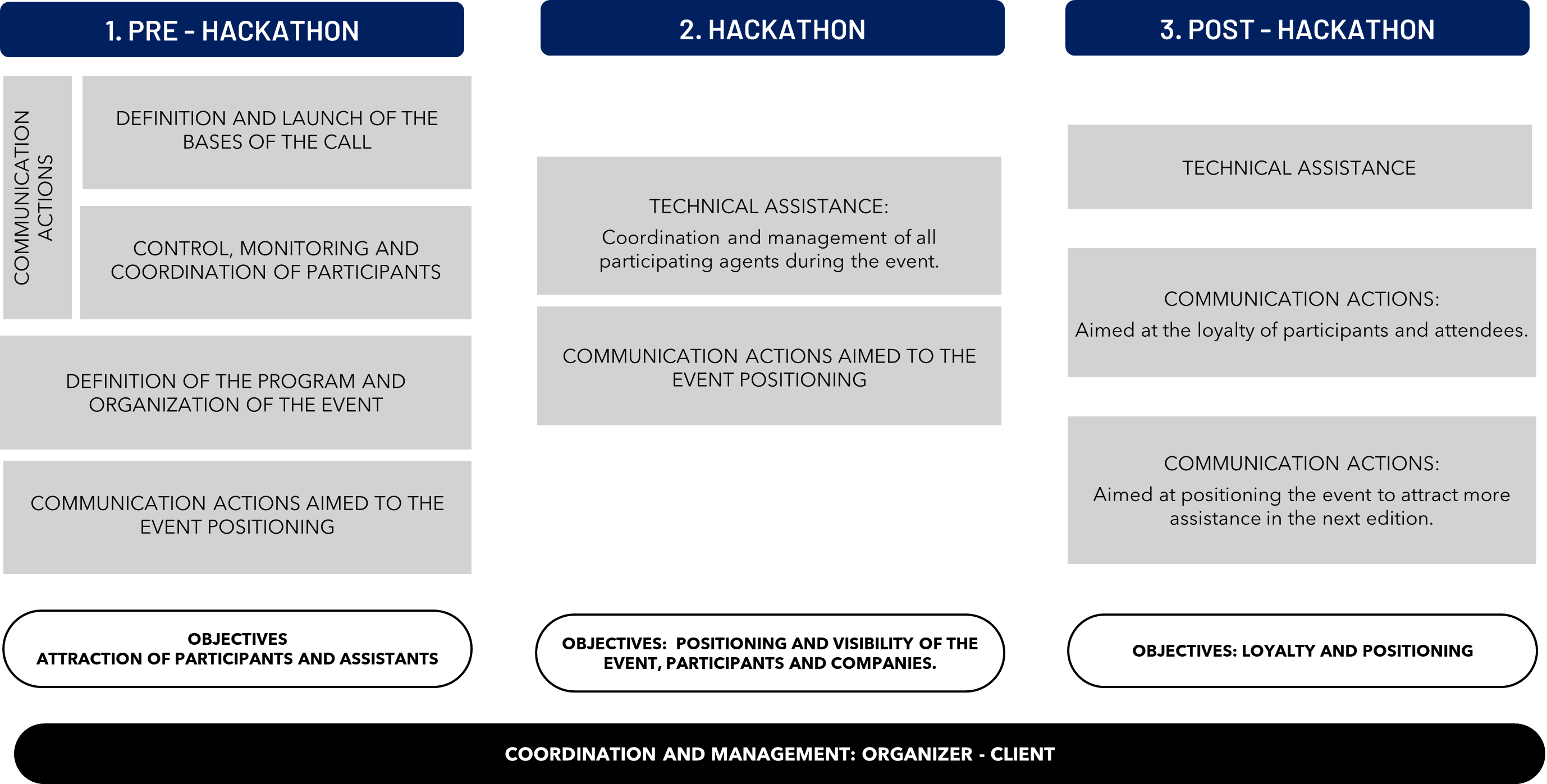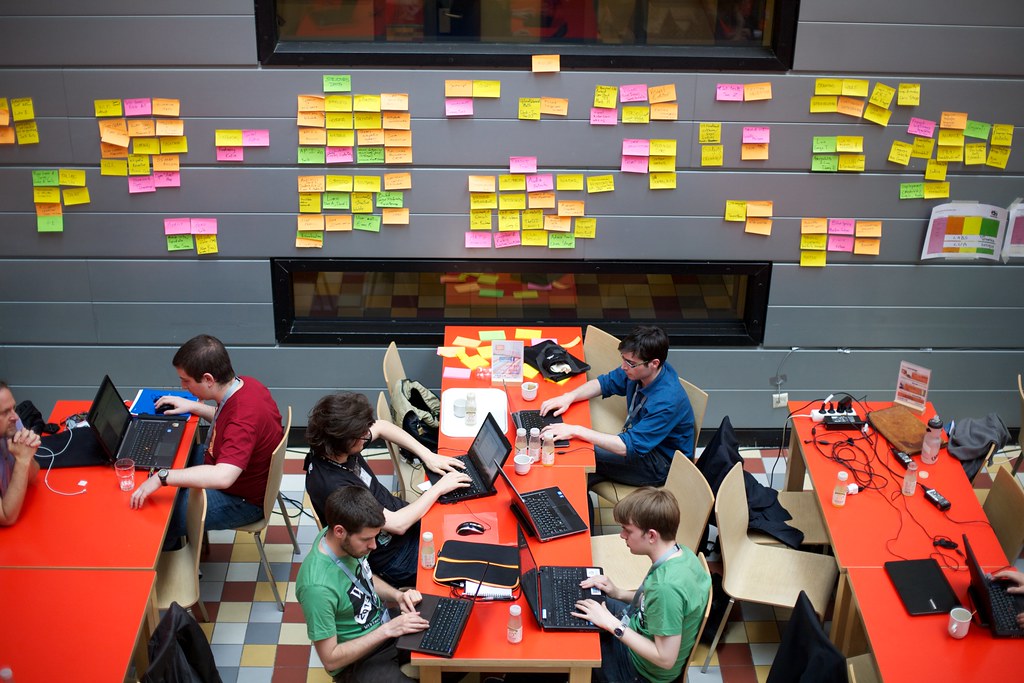HACKATHON

Thematic:
Addressing a challenge through the development of new solutions using the open data available. The challenges will be defined in collaboration with the private agents of the territory. Companies will describe the challenges they face in the development of their business and activity sector.
The Hackathon will seek to solve the challenges seted up by developing new ICT solutions that reuse the available open data.
Therefore, in addition, the following specific topics are proposed:
-
Develop applications that improve the publication of information and thus contribute to the improvement of the transparency portals existing in the territory or to the development of the new transparency portal.
-
Look for cross-platform solutions that promote the local achievement of the SDGs through private companies.
Hackathon format proposal:
-
Recommended format:
-
The recommended duration of the event is two - three days, taking place during the weekend (Friday noon - Sunday)
-
Include a mentor inspiring speech such as a TED talks of OPEN DATA and the reuse of DATA.
-
The hackathon is a competitive event that should be assessed by an open data experts committee. The reward of the competition is a complex issue. The reward should be sufficiently important in order to compensate the solution property transfer to the organizer or client.
-
Include a Demo Day with a least 6 investors and potential strategic partners. It should place the last day of the hackathon after the defense. Consists of presenting to investors the advances, both technical and commercial, that have been achieved during the event.
-
-
Offer of dynamization activities: A hackathon should provide a wide range of activities offer. The multidisciplinary profile of the participants leads to different needs to fulfil, such as learning, inspiration, or networking activities.
Regarding this issue, we recommend including in the program different activities and allowing attendees to choose among the available offer.
The following example of activities are recommended:
- Awareness talks on the use of open data.
- Informative workshops: Training and inspiration on the use of open data, available open data sources, etc.\
- Expert presentations addressed to the participants.
- Success stories of companies that have used open data.
- Spare time activities aimed to promote the networking: Concert, sport activities, cuisine workshops, among others.

Way of organization
The organization procedure is divided into the 3 following phases:
-
Definition of hackathon objectives and target.
-
Organization methodology: Methodology recommended in order to define and accomplish an integral organization for the hackathon.
-
Program proposal: As a result of the previous phases the definition of the typology of activities recommended to offer during the hackathon is provided.
Objectives and Target:
We distinguish two differentiated target audiences according to the objectives pursued for the event.
- Objective 1: Recruitment of teams for taking part in the proposed challenge. The teams should be made up of, at least, the following profiles:
1. Technical profiles such as researchers, students of technical profiles, experts in open data, experts in big data, developers and so on.
2. Business development profiles such as experts and / or students of business administration, management, marketing, business intelligence, and so on.
- Objective 2: Seek of private agents for the challenge definition and the raising awareness about the reuse of open data and its benefits for the business development.
- Other objectives:
1. Create the conceptual design of an information solution that will enable better promotion and the visualization of open data in the economy and in the entrepreneurship.
2. Receive 6 ideas from the received applications, and to support them through pilot pilots for the further development of these services.
Methodology:
In any event, the organization methodology should be divided in three main phases (that can be shown on the picture above).
1. Pre- event: This phase includes all the tasks related to the organization before the day of the event. Those tasks can be divided into two typologies: Organization and communication.
The organizational tasks are focused to set up the event (hackathon).
The communication actions are aimed to both attract participants and positioning the hackathon by generate branding value.
2. Hackathon: This phase includes all tasks related to assistance throughout the event. Moreover, communication actions that will maximize brand value, performance of the event and awareness of the participants should be executed.
3. Post-Hackathon: This phase includes all the follow – up tasks which are aimed to grow the next edition of the event (hackathon).

PRE – HACKATHON
-
4 months out:
-
Date and venue selection (be aware that hackathon is a at least 48 hours event so provide a venue with all the necessary facilities).
-
Theme selection: Define your theme and objectives. In order to achieve that purpose, complete the following steps:
-
Define the typology of private sector agents needed.
Arrange an awareness and training workshop.
The main objective of the workshop is to inspire and show the private sector how the reuse of the open data can be profitable for their business.
This workshop should include, at least, the following agenda:
-
Success stories of companies in order to inspire the attendees.
Key topic: Who, for what and what data do they use.
-
Training about the open data and the main sources available.
Key topics:
1. How to access and reuse open data.
2. Free sources of open data.
-
Awareness the reuse of open data for the private sector.
Key topics:
-
How to obtain value from the open data: A sectorial vision.
-
Identify the main challenges of the industry and the data that would be helpful to address them.
Definition of a list of data needed and identification of data available and data that is not open and requests to open it.
- Define the challenge to be addressed during the Hackathon.
Launch the participants call: Define the teams’ profile needed for the Hackathon according to the typology of challenge to address. The teams should be of 3 to 5 participants. Inform in the participants call about the hackathon rewards and benefits: Certificate (Voucher) of ODEON; Crossborder integration and visibility, the possibility of participating on the D Day with investors and the possibility of continuing the project during the Boot Camp.
-
Private agent’s research.
-
Investors research for the Demo Day.
-
Start the sponsor research in case it is needed.
-
Mentors research. The mentor profile should be an expert on the use of OPEN DATA both for developing business or for an open government. Inform in the mentor call that each participating teams/start-up will be supported with 1 mentor.
- Research speakers and jury. Start by researching speakers and jury members who have taken part at other Hackathons, compile a list of the ideal speakers and reach them.
-
3 months out:
-
Finalize speakers and jury members: Get bio information and photos and arrange travel and accommodation. Design the creativities for social media profiles in order to in order to communicate the main figures of the hackathon.
-
Launch the hackathon website and call for participation.
Key issues that should be included on the website are:
-
Teams Registration field.
-
Program.
-
Speakers and jury members bio and photos.
-
Theme and/or challenge to be addressed by the teams. Companies that face the challenges.
-
Competition rules and rewards.
-
Organizational details such as date and venue, transport to the venue and the facilities provided by the venue.
-
Set up the social media profiles and the ticketing or registration technology. Key issues recommended:
- Promote the hackathon on social media of special interest for the target: Twitter, Instagram and LinkedIn.
- Launch a profile for ticketing or registration on platforms such as Eventbrite or Meet Up
- Promote the hackathon: Set up advertising campaigns on the social media and by e-mail marketing actions. The recommended channels for reaching the audience are: Universities, hackathonspain.com, xataka.com and other online communities where the hackers share their experiences about DATA.
- Finalize venue details: Security, insurances, food service, and so on.
- Draft a schedule: Step outline for the staff and participants of the hackathon and program for the promotion.
- Design and print all the graphic materials needed such as photocall, trophies, programs, welcome packs, and so on.
-
2 months before: Finalizing details.
-
Send reminders. Send reminders with all the information and details to:
-
Speakers.
-
Members of the jury.
-
Participants.
-
Companies and other typologies of attendees.
-
-
Promote the hackathon: Push promotions to meet the branding goals. Promote also the confirmed participants.
-
-
A week before: Last-minute checklist. Those are the following need to keep track.
-
Ensure everyone has the same schedule.
-
Update the team’s registration list.
-
Update the company’s registration list.
-
Verify that everything is ready at the hackathon venue.
-
DURING THE HACKATHON
-
Technical assistance. At least one staff is required during the hackathon in order to ensure everything goes according to the script.
-
Communication actions.
-
-
Broadcast of the minute to minute of the hackathon on social media.
-
Streaming of the Hackathon on the event. Place several screens in a common place so that any assistant can see at all times what is happening in the rest of the spaces.
-
POST - HACKATHON
This phase is especially important in order to solve the major disadvantages of this kind of events.
-
A follow-up is necessary to help transform an idea into a real project that, perhaps, can become the germ of a company or a product developed by a big player that sponsors the hackathon. Here we provide some ideas for the follow – up:
-
Follow up events for developing the initial idea or prototype, such as startups weekends.
-
Provide the winning team with an space and resources for developing the winning idea.
-
Provide the winning team with the opportunity of taking part in a recruitment process of the companies that have participated in the hackathon.
-
Provide all the participants with a communication channel in order to contribute to further networking. The channel could be a telegram group, upload the contact details on the website (once everyone's permission is registered).
-
-
Tools
-
Mentimeter for interactive presentations, workshops, and meetings. https //www.mentimeter.com/
-
Benchmark email marketing or mailchimp for the e-mail marketing campaigns.
-
Eventbrite or Meet Up for ticketing or registration.
-
Wordpress for building the website.
-
Social Media advertising tools for promoting the hackathon.
-
HackMIT Hackathon Tools (https://code.hackmit.org/) is a list of open-source tools for hackathon coordinators and attendees.
-
Origami (https://origami.design/) is a free tool for designing modern user interfaces and interactions, created by Facebook, here the teams can create application interfaces for their products.
-
Pitcherific (https://pitcherific.com/) helps with preparing and rehearsing the pitches.
-
Trello (https://trello.com/) is a project management tool that the teams can use to organize better the activities should implement to complete their idea.
-
Kanbanize (https://kanbanize.com/) is also a project management tool that can help the teams to track their progress and optimize the workflow.
-
Heroku (https://www.heroku.com/) is a web application hosting tool.


